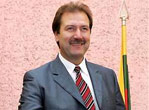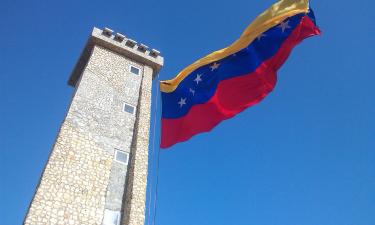Russian politician and businessman to head Lithuanian government
The relations between Russia and Lithuania are quite decent as opposed to scandals with Latvia and Estonia
It is now possible to say that the Labor Party (headed by businessman Viktor Uspaskich) has won parliamentary elections in Lithuania. Preliminary reports say that the Labor Party has gained 28.6 percent of votes.  The coalition of Social Democrats and Social Liberals, led by outgoing Prime Minister Algirdas Brazauskas and parliamentary speaker Arturas Paulauskas, obtained 20.6 percent of electors' votes. The conservative rightist party, the Fatherland Union, has been ranked third with 14.5 percent.
The coalition of Social Democrats and Social Liberals, led by outgoing Prime Minister Algirdas Brazauskas and parliamentary speaker Arturas Paulauskas, obtained 20.6 percent of electors' votes. The conservative rightist party, the Fatherland Union, has been ranked third with 14.5 percent.
The success of the Labor Party at the elections to the Lithuanian Seim was quite predictable. The party won the elections to the European parliament on June 13th of the current year and obtained five seats from the total number of 13 seats assigned for Lithuania. In addition, the party became quite popular among Lithuanians when it was established in the fall of 2003. According to one of the polls conducted on the threshold of the elections, one-third of the country's residents supported Viktor Uspaskich's party. The party did not lose its popularity even after the recent scandal connected with the resignation of the Lithuanian President, Rolandas Paksas, who was accused of his ties with the “Russian mafia and special services” in general and with the Russian entrepreneur Yury Borisov in particular.
Therefore, the victory of the Labor Party in Lithuania is not a sensation at all. However, Viktor Uspaskich's rightist adversaries do not miss a chance to blame him for his nationality – Russian. Lithuanian nationalist and rightist politicians believe that the nationality of the Labor Party leader testifies to his pro-Moscow stance.
The leader of the conservative Fatherland Union, ex-prime minister of Lithuania, Andrus Kubilius stated at a press conferences that the Labor Party's membership in the government would only harm the state.
Centrist and Leftist factions do not see anything disgraceful in Uspaskich's nationality – they do not consider the cooperation with his party unacceptable. Lithuanian President Valdas Adamkus neither approves nor disapproves the perspective to have a Russian national at the head of the government. However, Viktor Uspaskich has not expressed his intention to run for the position of the prime minister yet.
 Until recently, Viktor Uspaskich was known in Russia as a businessman, not as a politician. He funded the restoration and construction of several Orthodox churches in various Russian regions. Russian Patriarch Aleksey II decorated Uspaskich with the order of Daniil Moskovsky in 1999.
Until recently, Viktor Uspaskich was known in Russia as a businessman, not as a politician. He funded the restoration and construction of several Orthodox churches in various Russian regions. Russian Patriarch Aleksey II decorated Uspaskich with the order of Daniil Moskovsky in 1999.
Viktor Uspaskich is 45 years old. He has been living in Lithuania since 1987, when he arrived in the country to build a gas pipeline. He made his first big money in cooperation with the Russian gas giant Gazprom. Viktor Uspaskich's political adversaries probably use this fact to accuse him of the pro-Russian stance. Uspaskich currently owns a food-making company Vikonda, which employs 4,000 people. The businessman's fortune is estimated at $50 million.
There is no reason to believe that Lithuania might change the course of its foreign policy in Russia's favor in the event Viktor Uspaskich chairs the government. In addition, Moscow does not need that much. The relations between Russia and Lithuania are quite decent as opposed to scandals with Latvia and Estonia. It does not really matter for the Russian government, who wins the parliamentary elections in Lithuania and who chairs the Lithuanian government
Subscribe to Pravda.Ru Telegram channel, Facebook, RSS!




